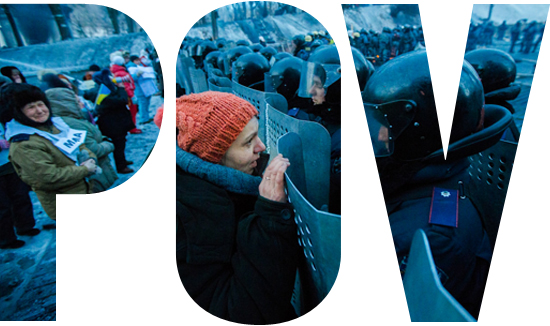POV: Sochi, with a Side Trip to Kiev
Putin’s Olympics made him look good, then Ukraine exploded

Photo by Flickr contributor Sasha Maksymenko
For Russia, hosting the Olympics was a matter of asserting its arrival in the “respectable” world, while denying that there was any legitimate question of its always having belonged there. This was a tall order to begin with, taller even as one tallies up the numerous points where slips were possible. Visually—at the price of a bit of crudity—it was hard to beat signs in Russian and English instructing one not to put the toilet paper in the toilet, but in a basket to the side. (At least much of post-Soviet Russia has toilet paper—in the old times, appropriate use was made of the Soviet press.)
Did President Vladimir Putin actually want to put his personal stamp—his face—on these Olympics from the outset? If so, he succeeded beyond his own efforts. With a week to go before the opening, both The New Yorker and The Economist obliged: the former with a skating Putin posing before a panel of judges, all of whom were Putin, too, the latter showing the same triumphant skater taking applause, while ignoring in the background his ice-dancing partner, “Russia” on her uniform, undignified-ly flopped on her derriere on the cracked ice.
The opening ceremonies went off, for the most part, without a hitch. The multicolored, cartoonish visuals depicting place and themes in Russian history were quite impressive (there is, after all, a lot of history), and Russians, in the sense of the old Chinese curse, have been fated to live in interesting times. There was no hard propaganda, Soviet-style—something that fewer and fewer even remember. The whole thing was rather good-humored; the failure of a fifth electric snowflake to morph into an Olympic ring was, given the scale of the whole display, not a big matter: the Russian domestic TV audience did not see the glitch as it occurred, but instead saw a clean rehearsal copy. Not a big deal—something on the order of lip-synching performers on the music stage at an NFL halftime show.
Up the Black Sea coast, then inland north, Ukraine’s capital of Kiev presented a distinctly un-Olympic scene—the stalemated confrontation between a large mass of protestors and the forces, armed, uniformed, and otherwise, poised to prevent them from occupying more buildings. They had been there since November, when President Viktor Yanukovych had turned from the expected sealing of a deal with the European Union that would turn Ukraine westward in quest of its future (and more immediately of an economic relief package for the debt-burdened state) in favor of an immediate injection of money from Russia.
The Olympic games opened, the stalemate persisted; the former ended Sunday, the latter the previous Tuesday night. Yanukovych, frustrated and assumedly concerned to show Putin that he too was a take-charge type, escalated the violence, upping the body count. Frequently, force works and deters protest. This time, the crowd was not frightened, but enraged, made more resolute—and in the hours that followed, one could see evidence of the failing confidence of the president’s “party,” the hedging and edginess of erstwhile allies in the legislature and Kiev’s police/security forces, and the disassociation of most of Ukraine west of Kiev from the president and his supporters. Events followed quickly—a truce imposed, largely on the opposition’s terms (although some found it too soft on Yanukovych from the outset). The rowdy parliament, late convert to the virtuous paths, voted to reinstate constitutional rules gone nearly a decade, demanding—then getting—the release of the jailed oppositionist Yulia Tymoshenko, and voted to impeach Yanukovych.
Heady stuff, with the final results (as far as anything can be final) not in yet. Putin constantly asserts Russia’s status as a great power, worthy of hosting a 2014 Olympics, entitled as well to impose its preferences in areas of its “privileged interests,” like Ukraine. He probably has not gotten what he wanted by way of influencing its direction and choices so far. Yanukovych, who has been a short-term opportunist and has never impressed Putin that much, has proven a weak reed, fleeing last weekend to Kharkiv, the core of Ukraine’s Russian-speaking east.
Both the European Union and the United States need to think hard about how their values and interests are engaged in all this, and act appropriately (caution and prudence are not synonyms for passivity). The games in Sochi over, the teams will go home. There are no closing ceremonies in Kiev, or in the other games on Russia’s periphery.
Walter D. Connor is a College of Arts & Sciences professor of political science, sociology, and international relations, former director of Soviet and East European studies at the US State Department Foreign Service Institute, and the author of several books, including Tattered Banners: Labor, Conflict, and Corporatism in Post-Communist Russia (Westview Press, 1996). He can be reached at wdconnor@bu.edu.
“POV” is an opinion page that provides timely commentaries from students, faculty, and staff on a variety of issues: on-campus, local, state, national, or international. Anyone interested in submitting a piece, which should be about 700 words long, should contact Rich Barlow at barlowr@bu.edu. BU Today reserves the right to reject or edit submissions. The views expressed are solely those of the author and are not intended to represent the views of Boston University.
Comments & Discussion
Boston University moderates comments to facilitate an informed, substantive, civil conversation. Abusive, profane, self-promotional, misleading, incoherent or off-topic comments will be rejected. Moderators are staffed during regular business hours (EST) and can only accept comments written in English. Statistics or facts must include a citation or a link to the citation.